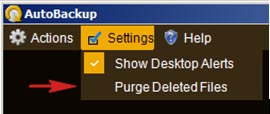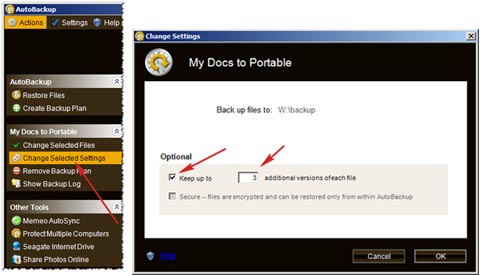This article will provide tips for handling a full OneTouch 4, Seagate FreeAgent, or Seagate FreeAgent Pro classic drive.
If you are just copying and pasting data to the drive, you will need to use your own judgment as to what data should remain on the drive and what should be deleted or moved to other storage devices (such as a larger external drive). If you are using the bundled software to perform backups, here are some tips.
OneTouch 4:
OneTouch 4 has two backup features. They are Backup and SafetyDrill (only available on OneTouch 4 Plus and OneTouch 4 Mini models).
Backup:
The Backup software keeps historical versions of each file you backup. If you only need the most recent version of the files you have backed up, you can remove older versions.
The Backups are kept in the Maxtor Backup folder of the OneTouch 4 drive. Inside that folder you will find a separate folder for each computer you backup. Under that, you will see a C folder and a History folder. The C folder contains the most recent backup. TheHistory folder has older versions of each file that has changed. Level 2 is the 2nd most recent, Level 3 is the 3rd most recent backup and so on. You can keep up to 10 levels.
Here is an example of the folder structure:
- Maxbackup
- Computer A
- C (This folder contains the most recent versions of files)
- Folder A
- Folder B
- Documents and Settings
- ...
- History
- Level 2 (only files that have changed between backups show here)
- Folder A
- Documents and Settings
- ...
- Level 3 (each level with a higher number will generally have fewer files)
- Documents and Settings
- ...
- Level 4
- Documents and Settings
- Level 2 (only files that have changed between backups show here)
- C (This folder contains the most recent versions of files)
- Computer A
If your drive is out of space, you can delete files that have multiple copies by deleting files within the higher numbered (and thus, older) levels of the History folder. Also, if you have a particularly large file (for example, a video you have edited several times), then you can find the historical copies of the large file and remove them. Multiple copies of a large file take up a great deal of space.
Note: If you have deleted a file from the main hard drive (C: ), then the backups of that file only exist in the History folders.
SafetyDrill backups:
SafetyDrill backups can be managed automatically or manually by using the “Manage SafetyDrill copies” option in the SafetyDrill section of Maxtor Manager. View the "OneTouch 4 SafetyDrill " section of this article for assistance.
FreeAgent series (using Seagate Manager)
The Seagate Manager Backup software keeps historical versions of each file you backup after they have been changed. If you only need the most recent version of the files you have backed up, you can remove older versions.
The Backups are kept in the Seagate Backup folder of the FreeAgent drive. Inside that folder you will find a separate folder for each computer you backup, then under that you will see a C folder and a History folder. The C folder contains the most recent backup. TheHistory folder has older versions of each file that has changed. Level 2 is the 2nd most recent, Level 3 is the 3rd most recent backup and so on. You can have up to 10 levels, but unless you have files that change often, you normally won’t have many files beyond level 4.
Here is an example of the folder structure.
Seagate backup
-
- Computer A
- C (This folder contains the most recent versions of files)
- Folder A
- Folder B
- Documents and Settings
- ...
- History
- Level 2 (only files that have changed between backups show here)
- Folder A
- Documents and Settings
- ...
- Level 3 (each level with a higher number will generally have fewer files)
- Documents and Settings
- ...
- Level 4
- Documents and Settings
- Level 2 (only files that have changed between backups show here)
- C (This folder contains the most recent versions of files)
- Computer A
If your drive is out of space, you can delete files that have multiple copies by deleting files within the higher numbered (and thus, older) levels of the History folder. Also, if you have a particularly large file (for example, a video you have edited several times), then you can find the historical copies of the large file and remove them. Multiple copies of a large file take up a great deal of space.
Note: If you have deleted a file from the main hard drive (C: ), then the backups of that file only exist in the History folders.
FreeAgent Pro classic (using Memeo AutoBackup)
AutoBackup has two features that can help remove unneeded files if the backup drive becomes full.
- Files that have been deleted from the primary drive can be removed from the AutoBackup backup set by following these steps:
Warning: Purging deleted files will remove all files that have been deleted from your primary drive. Make sure you do not need to restore any of these files before continuing.- Open AutoBackup.
- Choose Settings.
- Choose the option Purge Deleted Files.

- You can adjust how many historical versions are kept by following these steps:
- Open AutoBackup.
- Click on the job you want to modify.
- Choose the Change Selected Settings button on the left.
- Change the number of additional versions to keep OR uncheck the box to keep only one version of each file selected for backup.








